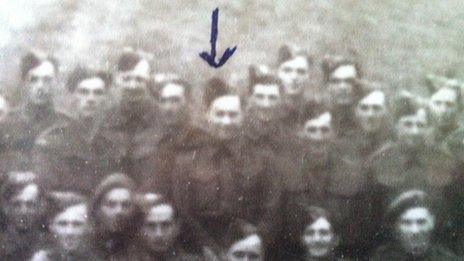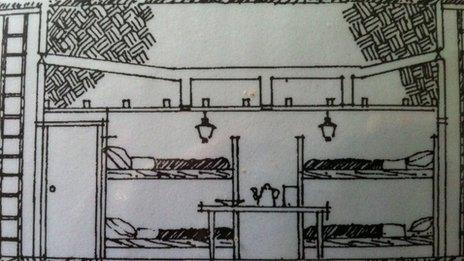Churchill's 'secret army' against Nazi invasion
- Published
Trevor Miners is one of a handful of surviving Secret Army veterans
This Sunday, people across Britain will remember those who sacrificed their lives for the country in World War Two.
And it will be a particularly poignant day for Winston Churchill's "secret army", who will be parading at the Cenotaph on Remembrance Sunday for the first time.
It was 1940, much of Europe had fallen to the Nazis and an invasion of Britain seemed imminent.
Churchill called it the nation's "darkest hour" and for one Cornish teenager it was the beginning of a great adventure.
Trevor Miners, 86, from Perranporth, was part of Churchill's Auxiliary Units, a volunteer force trained to be the underground line of defence in the event of a German invasion.
Trained to kill
Mr Miners was 16-years-old when, in 1943, he was asked to sign the Official Secrets Act and found himself one of 3,500 volunteers recruited to Britain's resistance army.
"We were sent to a base in Oxfordshire," Mr Miners said.
"We were trained to kill, how to use a knife to kill a man quietly.
"The plan was that when the invasion came our unit would hide in an underground bunker and let the Nazis roll over the top of us.
"Then after a month we were to come out at night and attack them, destroy their munitions dumps, railway lines, things like that."
Mr Miners' bunker at Cligga Head near Perranporth was one of about 500 such bunkers, known as Operational Bases, which were dug all across Britain.

Trevor Miners was told to say he was in the Home Guard when he joined the unit
"It wasn't as concealed as it should have been," said Mr Miners. "An RAF corporal thought it would be the ideal courting spot, which was a bit embarrassing for us.
"We had to move to another base at a former tin mine nearby."
The individual units were entirely self-contained, with no knowledge of the identity or locations of the other resistance groups, although there are thought to have been about 250 volunteers in Cornwall.
"We were only a small unit of seven men," he said. "After Dunkirk it looked as if the Germans would invade right away.
"We had food rations for five weeks in the bunker and we had any amount of explosives.
"In fact, we were so well equipped it was unbelievable."

Inside the base from which the Auxiliary Unit was to attack Nazi invaders
"I'm sure they would have found us in the end. So fortunately for us the invasion never happened."
The bunker was about 15ft (4.6m) below ground, but has been filled in since the war.
Historian Tom Sykes said: "These men were signing up to a suicide mission.
"There was no way out for them, they were going to be caught and tortured, they were ready to kill themselves before allowing themselves to be captured."
The Auxiliary Units were stood down in 1944 when the threat of invasion was finally lifted. Churchill's secret army became Churchill's forgotten army.
"We had signed the Official Secrets Act, you see," Mr Miners said.
"We would never talk about what we were trained to do. One of my unit was even sent a white feather by someone who thought he was a coward for not going out to fight, but we knew different."
Mr Sykes has campaigned for years to have the work of the Auxiliary Units officially acknowledged.
Now they have been granted permission to take part in the Remembrance Day parade at the Cenotaph on Sunday
It is unclear how many of the men who would have made up Britain's resistance army remain alive, but Mr Miners will be making the journey from Perranporth.
"I wish my friends could be there with me," he said.
"I wish this could have been done years ago so they could have been there with me but I will march to represent all of them."
- Published22 February 2012
- Published2 April 2011
- Published23 January 2011
- Published23 July 2010